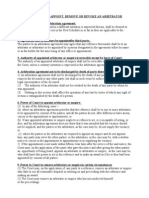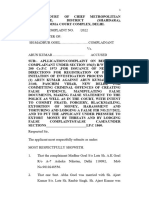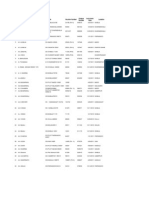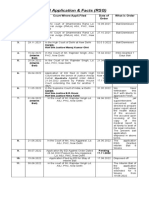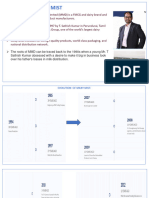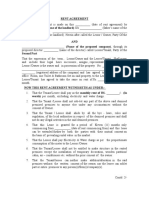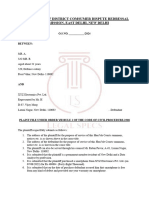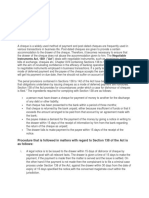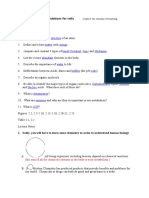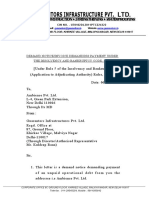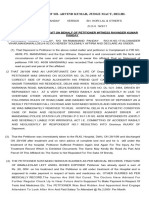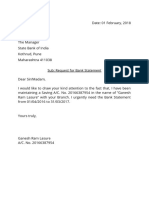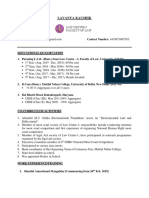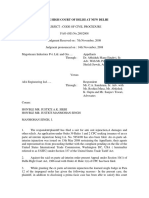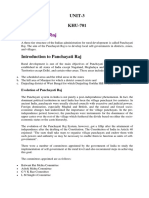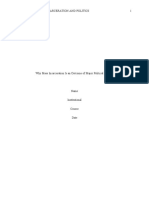Gurjant Singh Vs Krishan Chander and Others On 27 March 2000
Gurjant Singh Vs Krishan Chander and Others On 27 March 2000
Uploaded by
Madhur GoelCopyright:
Available Formats
Gurjant Singh Vs Krishan Chander and Others On 27 March 2000
Gurjant Singh Vs Krishan Chander and Others On 27 March 2000
Uploaded by
Madhur GoelOriginal Title
Copyright
Available Formats
Share this document
Did you find this document useful?
Is this content inappropriate?
Copyright:
Available Formats
Gurjant Singh Vs Krishan Chander and Others On 27 March 2000
Gurjant Singh Vs Krishan Chander and Others On 27 March 2000
Uploaded by
Madhur GoelCopyright:
Available Formats
Gurjant Singh vs Krishan Chander And Others on 27 March, 2000
Gurjant Singh vs Krishan Chander And Others on 27 March,
2000
Equivalent citations: AIR2001RAJ211, 2000(4)WLC266, 2000(2)WLN570
Author: B.S. Chauhan
Bench: B.S. Chauhan
ORDER
Chauhan, J.
(1). In the instant case, respondent No. 1 was given time to file written statement to the election
petition, vide order dated 11.1.2000 and the matter was directed to be listed on 21.2.2000. The
written statement was filed and a copy of the same was served upon the learned counsel for the
election petitioner, but the Bar Association had resolved to observe strike on 24.2.2000, therefore,
the matter was mentioned on 23.2.2000 that it would not be possible for the Advocates to appear on
24th Feb, therefore, the matter may be adjourned further and meanwhile, as written statement has
been filed, petitioner may be given time to file rejoinder. It was requested and agreed that the order
will be passed next day as the matter had not been on the board that day, not the file could be
summoned.
(2). On 24.2.2000, though none of the lawyers appeared in the Court but the order was passed to list
the matter on 16.3.2000 for further orders and meanwhile petitioner was allowed to file rejoinder.
Rejoinder has been filed in detail and when the matter was listed on 16.3.2000, Mr. Bhoot, learned
counsel for respondent No. 1, raised the objection regarding right of petitioner to file rejoinder. The
matter was heard in length on 16.3.2000 and again on 23.3.2000. Though the leave had been
granted on oral request of the learned counsel for petitioner and Mr. Bhoot was aware of it, but
Considering the seriousness of the objection of Mr. Bhoot, both the parties were allowed to argue on
merit.
(3). There is no dispute at the Bar to the extent that leave can be granted by the Court to file
replication/rejoinder on an oral request of petitioner-plaintiff as held in a case reported in 1972(2)
Mys. L.J. 328 (1), for the reason that the provisions of Order 8 Rule 9 C.P.C. do not require any
written application. But the serious question which has been agitated by Mr. Bhoot is that leave can
be granted only by application of mind by the Court provided it is satisfied that some new point has
been raised in the written statement, which requires reply and it cannot be filed as is permitted to be
filed in writ jurisdiction.
(4). Order 8 Rule 9 C.P.C. provides for subsequent pleadings, and reads as under:-
Indian Kanoon - http://indiankanoon.org/doc/449712/ 1
Gurjant Singh vs Krishan Chander And Others on 27 March, 2000
"No pleading subsequent to the written statement of the defendant, other than by
way of defence to be set-off or counter claim, shall be presented except by the leave of
the court and upon such terms as the Court thinks fit, but the Court may, at any time,
require a written statement or additional written statement from any of the parties
and fix a time for presenting the same."
(5). Thus, the submission made by Mr. Bhoot is that the aforesaid provisions do not provide for a
right of the plaintiff to file replication/rejoinder in a routine manner. However, Mr. Mehta, learned
counsel for the petitioner, has submitted that in case a new fact is brought by the
defendant-respondent in the written statement, the plain-tiff-petitioner may be allowed to file
rejoinder.
(6). In Shakoor & Ors. vs. Jaipur Development Authority & ors. (2), this Court considered the
application of the provisions of Order 8 Rule 9 even in a case of miscellaneous application under
Order 39 rule 1, C.P.C. and held that undoubtedly the contingency of filing a rejoinder does not arise
in every case because it could arise only in such cases where some new plea or fact is introduced by
the defendant in his reply, only with the leave of the Court and the purpose of putting such an
embargo is that plaintiff may not be permitted to introduce a pleading subsequently by a rejoinder.
The procedure provided for a trial for the suit and miscellaneous proceedings is meant for finding
out truth and to do justice. The procedure is always a hand-maid of justice and full opportunity
should he given to the parties to bring forth their case before the Court, unless such procedure is
specifically prohibited under the law and if Court is satisfied that subsequent pleadings should not
be permitted, the plaintiff cannot be denied his right to file a rejoinder.
(7). In Veerasekhara Varamarayar vs. Amirthavalliammal & Ors. (3), the Division Bench of Madras
High Court held that where the defendant brings the new facts in the written statement, the plaintiff
must get a chance to file a rejoinder challenging the truth and binding nature of the
allegations/averments made in the written statement. But law does not compel the plaintiff to file a
replication/rejoinder and the plaintiff cannot be deemed to have admitted the same simply because
he had not filed the rejoinder.
(8). In Rohan Lal Choudhary vs. Prem Prakash Gupta (4), the Patna High Court has taken the same
view holding that the plaintiff is entitled to join issues with the defendant in respect to all those
allegations which are made in the written statement and may lead evidence in rebuttal of those
allegations notwithstanding the fact that he did not file any rejoinder.
(9). In M/s. Ajanta Enterprises vs. Bimla Charan Chatterjee & Anr. (5), this Court held that it is not
permissible to file a rejoinder to all allegations made in the written statement and the rejoinder or
replica can be filed with the permission of the Court only if the defendant has raised a plea of new
facts and, thus, permission must be granted after taking into consideration all the facts and
circumstances of the case, especially the pleas which have been raised in the written statement. In
the garb of submitting a rejoinder, a plaintiff cannot be allowed to introduce new pleas in his plaint
so as to alter the basis of his plaint. In a rejoinder, plaintiff may simply explain if certain additional
facts have been taken in the written statement but he cannot be allowed to come forward with an
Indian Kanoon - http://indiankanoon.org/doc/449712/ 2
Gurjant Singh vs Krishan Chander And Others on 27 March, 2000
entirely new case in the rejoinder. The original pleas cannot be permitted to be altered under the
garb of filing a rejoinder. Rejoinder/replication cannot be permitted for introducing pleas which are
not consistent with the earlier pleas.
(10). In State of Rajasthan vs. Mohammed Ikbal (6), this Court considered its earlier judgments in
M/s. Ajanta Enterprises (supra) and M/s. Gannon Dunkerley & Co. Ltd. vs. Steel Authority of India
Ltd. (7), and held that the plaintiff cannot be allowed to introduce new pleas under the garb of filing
rejoinder, so as to alter the basis of his plaint. In rejoinder, plaintiff has a right to explain only the
additional facts incorporated by the defendant in his written statement. In rejoinder, plaintiff
cannot be permitted to come forward with an entirely new case or raise inconsistent pleas so as to
alter his original cause of action.
(11). In Ishwar Lal & Anr. vs. Ashok & Anr. (8), this Court held that rejoinder-affidavit can be filed
only with leave of the court and it is a matter of judicial discretion vested in the trial court which
should be exercised only if there are cogent reasons to allow the plaintiff to file rejoinder to the
written statement. In Saiyed Sirajul Hasan vs. Sh. Syed Murtaza Ali Khan Bahadur & Ors. (9), the
Delhi High Court had held that rejoinder cannot be filed as a matter of right and it is an absolute
discretion of the Court to grant leave to present a fresh pleading. A party seeking permission under
Order 8 Rule 9 has to provide "cogent reason for permission" to file additional plea.
(12). In M/s. Anant Construction (P) Ltd. Vs. Ram Niwas (10), the Delhi High Court held that a
replication to written statement cannot be filed, not can be permitted to be filed ordinarily much
less in routine. The Court has a discretion to permit replication and after scrutinizing the plaint and
the written statement, if it comes to the conclusion that the plaintiff can be permitted to joint
specific pleadings to a case, specifically and newly raised in the written statement, and such a need
arises for the plaintiff introducing a plea by way of "confession and avoidance." The Court further
held that a mere denial of the defendant's case by the plaintiff need no replication for the reason that
he can safely rely on rules of implied or assumed traverse and joinder of issue.
(13). Thus, in the sum and substance, the plaintiff cannot be permitted to raise a new plea under the
garb of filing rejoinder- affidavit, or take a plea inconsistent to the pleas taken by him in the
petition, nor the rejoinder can be filed as a matter of right, even the Court can grant leave only after
applying its mind on the pleas taken in the plaint and the written statement.
(14). Before the instant case could be examined in view of the aforesaid legal proposition, Mr.
Mehta, learned counsel for the petitioner, submitted that petitioner may be permitted to file
rejoinder only of pleadings with respect to Annex. F and G. of the Election Petition as replied in the
written statement. Rest of the rejoinder, which runs to 50 pages, may be straight-way rejected.
(15). Thus, the controversy remains limited only with respect to the pleadings in Annex. F and G. In
para 15 of the written statement, respondent No. 1 has taken the plea of non-admissibility of the
documents as such and regarding verification. The same cannot be held to be raising a new factual
plea. Para 16 of the written statement again refers to inadmissibility of documents contained in
Annex. F which contains round-wise result sheets. The same also does not raise any new fact. In
Indian Kanoon - http://indiankanoon.org/doc/449712/ 3
Gurjant Singh vs Krishan Chander And Others on 27 March, 2000
para 18 of the written statement, it has been submitted that documents showing the round-wise
counting (Annx.F) was not prepared by the official concerned with the election, rather the same was
"prepared by the Statistical Department who prepare the sheets as and when it receives the
round-wise figures of counting. In fact, these papers 007 (F) are the Proforma of the Statistics
Department for the purpose of feeding data into the computer. In para 19 of the written statement,
again the same averments have been made as are made in para 18 above. In para 13 and 14 of the
rejoinder, there has been denial of the averments made in para 18 and 19 of the written statement
which amounts to raising new facts and the rejoinder may be permitted only to the extent of para
No. 18 and 19 so far Annex. F is concerned.
(16). In para 22 of the written statement, it has been submitted that petitioner has purposely
suppressed the identity of the counting agents who had prepared the documents contained in
Annex. G and the documents therein are false and fabricated documents. In para 17 of rejoinder, the
same has been denied. Further, as reference has been made in para 22 also with respect to the
proceedings that documents were not supplied as per the requirement of the provisions of Sec. 81
(3) of the Representation of People Act, 1951, and the earlier dispute which had been decided by this
Court and ultimately went to the Hon'ble Supreme Court, actually do not relate to a new factual
plea. Thus, the same is rejected.
(17). Thus, in view of the above, the rejoinder is permitted to be filed only to the extent of para 18
and 19. Ordered accordingly.
(18). List this case on 03.4.2000 for filing Admission/Denial of documents at 2:00 p.m.
Indian Kanoon - http://indiankanoon.org/doc/449712/ 4
You might also like
- Written ArgumentsDocument5 pagesWritten ArgumentsMadhur Goel0% (1)
- Order 8 Rule 5 CPCDocument3 pagesOrder 8 Rule 5 CPCVemula Venkata Pavankumar100% (2)
- Order 7 Rule 11 CPCDocument2 pagesOrder 7 Rule 11 CPCProximityNo ratings yet
- In The Court of Senior Civil JudgeDocument17 pagesIn The Court of Senior Civil JudgekunalNo ratings yet
- Petition US 22-A & 22-B Cr.P.C. (For Registration of Case) - 489-F PPC - M.Shafique.Document7 pagesPetition US 22-A & 22-B Cr.P.C. (For Registration of Case) - 489-F PPC - M.Shafique.Lawyers ConstellationNo ratings yet
- Power of Court To Appoint ArbitratorDocument2 pagesPower of Court To Appoint ArbitratorNaziha Mohammad TaqiNo ratings yet
- Final ArgumentsDocument1 pageFinal ArgumentsshivendugaurNo ratings yet
- Budget 2024 P3 Schemes Mrunal SDDocument58 pagesBudget 2024 P3 Schemes Mrunal SDphanindraNo ratings yet
- 564 HaveriDocument572 pages564 HaveriayushgoudarNo ratings yet
- Petition For Annulment of AdjudicationDocument1 pagePetition For Annulment of AdjudicationSathya MandyaNo ratings yet
- Model Draft of Written StatementDocument5 pagesModel Draft of Written Statementdebojoyti.chakraborty25No ratings yet
- Mahindra Xuv3xoDocument16 pagesMahindra Xuv3xoWasi QureshiNo ratings yet
- 1563Document14 pages1563Madhur GoelNo ratings yet
- Order VI Rule 17, CPC Allowed Judgment of Shafi SiddiquiDocument4 pagesOrder VI Rule 17, CPC Allowed Judgment of Shafi SiddiquiRaja Ghazanfar Ali MemonNo ratings yet
- Himachal PlotsDocument4,936 pagesHimachal PlotsRavi KumarNo ratings yet
- Actual Appeal Sachin Vs Amit KumarDocument22 pagesActual Appeal Sachin Vs Amit KumarMadhur GoelNo ratings yet
- Bail Application & Facts ED vs. RSGDocument1 pageBail Application & Facts ED vs. RSGAmbience LegalNo ratings yet
- Haward City Directory 23Document390 pagesHaward City Directory 23Mannu GoyatNo ratings yet
- MilkymistDocument31 pagesMilkymistgaya3thirumoorthyNo ratings yet
- Format For Cancellation of BailDocument8 pagesFormat For Cancellation of BailAnujNo ratings yet
- In The Court of The PRL - Civil Judge and JMFC at Maddur FIR No.445/2020 CRIME No.112/2020 BetweenDocument2 pagesIn The Court of The PRL - Civil Judge and JMFC at Maddur FIR No.445/2020 CRIME No.112/2020 BetweenSathya MandyaNo ratings yet
- Format - Rent AgreementDocument2 pagesFormat - Rent AgreementMukesh LalNo ratings yet
- Robin PlaintDocument5 pagesRobin Plaintrobingk112233No ratings yet
- Form 02Document2 pagesForm 02Sathya MandyaNo ratings yet
- Orignal Suit With Chief Examination of Akbar AliDocument11 pagesOrignal Suit With Chief Examination of Akbar AliMallikarjuna MokaNo ratings yet
- Examination in ChiefDocument2 pagesExamination in ChiefKerubo MochogeNo ratings yet
- In The High Court of Judicature at Madras Special Original Jurisdiction W.P No.5224 OF 2012 Etc Batch CasesDocument20 pagesIn The High Court of Judicature at Madras Special Original Jurisdiction W.P No.5224 OF 2012 Etc Batch CasesAnnapooraniNo ratings yet
- ICU Bed IEC 60601-1-2Document30 pagesICU Bed IEC 60601-1-2CE CERTIFICATENo ratings yet
- Section 138 of Ni ActDocument6 pagesSection 138 of Ni Actshailesh nehra100% (1)
- Compounding of Offence 138 of Negotiable Instruments Act, 1881 Not Permissible Except With The Consent of The Complainant.Document10 pagesCompounding of Offence 138 of Negotiable Instruments Act, 1881 Not Permissible Except With The Consent of The Complainant.Anuj GoyalNo ratings yet
- In The Matter of Vs SMT Sunita On 22 December 2011Document5 pagesIn The Matter of Vs SMT Sunita On 22 December 2011venugopal murthyNo ratings yet
- Before The Hon'Ble Family Court, - HMA Petition No. - OFDocument3 pagesBefore The Hon'Ble Family Court, - HMA Petition No. - OFRanjithaNo ratings yet
- IN THE COURT OF Ms AISHWARYA SINGHDocument1 pageIN THE COURT OF Ms AISHWARYA SINGHMadhur GoelNo ratings yet
- Local Body Contempt 2 Affidavit WatermarkDocument16 pagesLocal Body Contempt 2 Affidavit WatermarkAnnapoorani100% (1)
- In The High Court of Judicature at Madras: Page No: 1 No of CorrnsDocument12 pagesIn The High Court of Judicature at Madras: Page No: 1 No of CorrnsAnnapooraniNo ratings yet
- Crl. SLP Format 2014Document70 pagesCrl. SLP Format 2014shivendugaurNo ratings yet
- To Amend The PlaintDocument10 pagesTo Amend The PlaintsuregaNo ratings yet
- 138 ComplaintDocument13 pages138 ComplaintMadhur GoelNo ratings yet
- Chemical Foundation For CellDocument11 pagesChemical Foundation For CellDickson Yeap100% (2)
- Demand Notice - For StudyDocument10 pagesDemand Notice - For StudyAmbience LegalNo ratings yet
- Writ of MandamusDocument33 pagesWrit of Mandamusaditi todariaNo ratings yet
- FaqDocument7 pagesFaqAnnapooraniNo ratings yet
- In The High Court of Judicature at Madras W.P. No. of 2007Document33 pagesIn The High Court of Judicature at Madras W.P. No. of 2007AnnapooraniNo ratings yet
- DIPS Sitamarhi 2016 PDFDocument28 pagesDIPS Sitamarhi 2016 PDFIndia Heals-2020No ratings yet
- Form 02Document2 pagesForm 02Sathya MandyaNo ratings yet
- In The Court of Ms. Mayuti Singh, P.O./Mact/East Karkardooma Courts/ Delhi MACT NO.-653/2023Document3 pagesIn The Court of Ms. Mayuti Singh, P.O./Mact/East Karkardooma Courts/ Delhi MACT NO.-653/2023Madhur GoelNo ratings yet
- Affi Ravinder PandeyDocument2 pagesAffi Ravinder PandeyMadhur GoelNo ratings yet
- Bank Statement Request LetterDocument1 pageBank Statement Request LetterpraomNo ratings yet
- 138 Ni Act Latest Judgement On CompoundingDocument23 pages138 Ni Act Latest Judgement On CompoundingDeepak KohliNo ratings yet
- UPSC IAS Mains LAST 10 Year Papers Public Administration OptionalDocument25 pagesUPSC IAS Mains LAST 10 Year Papers Public Administration Optionalmb rajNo ratings yet
- Gift DeedDocument3 pagesGift DeedjunkyardNo ratings yet
- Structure of RnaDocument44 pagesStructure of RnaAditi CharakNo ratings yet
- Lavanya ResumeDocument2 pagesLavanya ResumeMukesh LalNo ratings yet
- Form of Application For Seeking Information Section 6 (1) & 7 (1) Under The Right To Information Act - 2005. TO, The Public Information OfficerDocument10 pagesForm of Application For Seeking Information Section 6 (1) & 7 (1) Under The Right To Information Act - 2005. TO, The Public Information OfficerSathya Mandya100% (1)
- Case Study-RedbullDocument3 pagesCase Study-RedbullBalaram SahaNo ratings yet
- Copy Application Magistrate Court PDFDocument2 pagesCopy Application Magistrate Court PDFAnnapooraniNo ratings yet
- Mohd Raees - Court Fee Refund ApplicationDocument4 pagesMohd Raees - Court Fee Refund ApplicationkmassociatesofficeNo ratings yet
- EDITED-FORM CA of Priti GeraDocument15 pagesEDITED-FORM CA of Priti GeraAmbience LegalNo ratings yet
- Application For Interim InjunctionDocument2 pagesApplication For Interim InjunctionBusiness Law Group CUSBNo ratings yet
- Declaration SuitDocument10 pagesDeclaration SuitalismdsaifNo ratings yet
- Magotteaux Industries vs. Aia EngineeringDocument28 pagesMagotteaux Industries vs. Aia EngineeringSaurabh SethNo ratings yet
- Actual Appeal Sachin Vs Amit KumarDocument22 pagesActual Appeal Sachin Vs Amit KumarMadhur GoelNo ratings yet
- 6308 Mamta MattaDocument13 pages6308 Mamta MattaMadhur GoelNo ratings yet
- Affi Ravinder PandeyDocument2 pagesAffi Ravinder PandeyMadhur GoelNo ratings yet
- 1563Document14 pages1563Madhur GoelNo ratings yet
- 138 ComplaintDocument13 pages138 ComplaintMadhur GoelNo ratings yet
- SMPP762Document3 pagesSMPP762Madhur GoelNo ratings yet
- IN THE COURT OF Ms AISHWARYA SINGHDocument1 pageIN THE COURT OF Ms AISHWARYA SINGHMadhur GoelNo ratings yet
- In The Court of Ms. Mayuti Singh, P.O./Mact/East Karkardooma Courts/ Delhi MACT NO.-653/2023Document3 pagesIn The Court of Ms. Mayuti Singh, P.O./Mact/East Karkardooma Courts/ Delhi MACT NO.-653/2023Madhur GoelNo ratings yet
- HVV665Document3 pagesHVV665Madhur GoelNo ratings yet
- 380 2022 Rewari DharuheraDocument7 pages380 2022 Rewari DharuheraMadhur GoelNo ratings yet
- CamScanner 11-04-2022 10.02.54Document3 pagesCamScanner 11-04-2022 10.02.54Madhur GoelNo ratings yet
- Mukesh Kumar ReplicationDocument10 pagesMukesh Kumar ReplicationMadhur GoelNo ratings yet
- In The Court of Sh. Sunil Kumar Rana Asj Karkardomma Courts, DelhiDocument3 pagesIn The Court of Sh. Sunil Kumar Rana Asj Karkardomma Courts, DelhiMadhur GoelNo ratings yet
- New Microsoft Office Word DocumentDocument1 pageNew Microsoft Office Word DocumentMadhur GoelNo ratings yet
- To Whomsoever It May Concern: (#) Name of The claimant:-MS - SHILPI GOELDocument1 pageTo Whomsoever It May Concern: (#) Name of The claimant:-MS - SHILPI GOELMadhur GoelNo ratings yet
- Annexture Rohit Sajwan InjuryDocument2 pagesAnnexture Rohit Sajwan InjuryMadhur GoelNo ratings yet
- In The Court of SH: Arvind Kumar Judge Mact, Delhi.: Doctrine of Res Ispa Locuter AppliesDocument3 pagesIn The Court of SH: Arvind Kumar Judge Mact, Delhi.: Doctrine of Res Ispa Locuter AppliesMadhur GoelNo ratings yet
- Review Petition: Section 114Document4 pagesReview Petition: Section 114Madhur GoelNo ratings yet
- Petition of Kirti Gupta InjuryDocument5 pagesPetition of Kirti Gupta InjuryMadhur GoelNo ratings yet
- American Forum Cafe Steve Cohen PDFDocument26 pagesAmerican Forum Cafe Steve Cohen PDFAdan Ahmed BulaleNo ratings yet
- Jadewell Parking Systems Corporation V. Hon. Judge Lidua Sr. G.R. No. 169588. October 7, 2013Document1 pageJadewell Parking Systems Corporation V. Hon. Judge Lidua Sr. G.R. No. 169588. October 7, 2013Czarianne GollaNo ratings yet
- Fpa Australia - Ps 06 v1 Water Tanks For Fire Protection SystemsDocument11 pagesFpa Australia - Ps 06 v1 Water Tanks For Fire Protection Systemsyogesh0% (1)
- QB-RAJABHASHA For Group BDocument5 pagesQB-RAJABHASHA For Group BSuneel Maddheshia0% (1)
- Partnership AcccoutingDocument72 pagesPartnership AcccoutingSaroj DashNo ratings yet
- 1 Acord Pro Black Car 0017376-01-CaDocument4 pages1 Acord Pro Black Car 0017376-01-CacarlountalNo ratings yet
- Hagad vs. Gozo-Dadole, G.R. No. 108072, 12 December 1995Document7 pagesHagad vs. Gozo-Dadole, G.R. No. 108072, 12 December 1995jullian UmaliNo ratings yet
- Dilip Simeon - Gandhi - S Legacy (2010)Document21 pagesDilip Simeon - Gandhi - S Legacy (2010)shubham.rathoreNo ratings yet
- DR K M Munshi Ji The Great Visionary and An Architect of Modern IndiaDocument16 pagesDR K M Munshi Ji The Great Visionary and An Architect of Modern Indiagk mNo ratings yet
- Court - Listing by Officer 202403071032086047Document159 pagesCourt - Listing by Officer 202403071032086047davithicks7No ratings yet
- Feelings and Emotions Flash Cards: How To Shrink The Print SizeDocument15 pagesFeelings and Emotions Flash Cards: How To Shrink The Print SizeLevente DobaiNo ratings yet
- Man Charged With Deliberate Homicide in Domestic IncidentDocument11 pagesMan Charged With Deliberate Homicide in Domestic IncidentNBC Montana100% (1)
- EAadhaarDocument1 pageEAadhaaryansukushwahNo ratings yet
- Consti Law II-26Document14 pagesConsti Law II-26Prarthana GuptaNo ratings yet
- Bagh Express Sleeper Class (SL)Document2 pagesBagh Express Sleeper Class (SL)Prapendra SinghNo ratings yet
- Ruks Konsult and Construction V AdworldDocument4 pagesRuks Konsult and Construction V AdworldPablo Jan Marc FilioNo ratings yet
- User AgreementDocument2 pagesUser Agreementestee.ukejeNo ratings yet
- P.S ProjectDocument25 pagesP.S ProjectNikhil TupakulaNo ratings yet
- National Anti-Poverty Commission ResponseDocument4 pagesNational Anti-Poverty Commission ResponseVERA FilesNo ratings yet
- SRPO S10 (3) APPLICATION by MeDocument4 pagesSRPO S10 (3) APPLICATION by MeAbdur RehmanNo ratings yet
- Script For 14Document2 pagesScript For 14Tshering Namgay100% (1)
- UNIT 3 Notes Panchayati RajDocument7 pagesUNIT 3 Notes Panchayati RajAditya KumarNo ratings yet
- JOHN C CHASTEEN Born in Blood and Fire Book ReviewDocument2 pagesJOHN C CHASTEEN Born in Blood and Fire Book ReviewChris Phillips33% (3)
- House Rental Agreement PDFDocument2 pagesHouse Rental Agreement PDFIris LangubNo ratings yet
- Abuse of Dominance in Digital Platforms: An Analysis of Indian Competition JurisprudenceDocument27 pagesAbuse of Dominance in Digital Platforms: An Analysis of Indian Competition Jurisprudenceramya raviNo ratings yet
- Winter Solved Assignment For 9thDocument123 pagesWinter Solved Assignment For 9thamaanyousuf267No ratings yet
- Electrical Permit Requirements: Department of The Building OfficialDocument2 pagesElectrical Permit Requirements: Department of The Building OfficialrommelNo ratings yet
- The Irish DiasporaDocument3 pagesThe Irish DiasporakometianidakoNo ratings yet
- Exploring Conceptual ArtDocument14 pagesExploring Conceptual ArtPARTRICA leeNo ratings yet
- Running Head: Mass Incarceration and Politics 1Document16 pagesRunning Head: Mass Incarceration and Politics 1kimoda freelancerNo ratings yet





